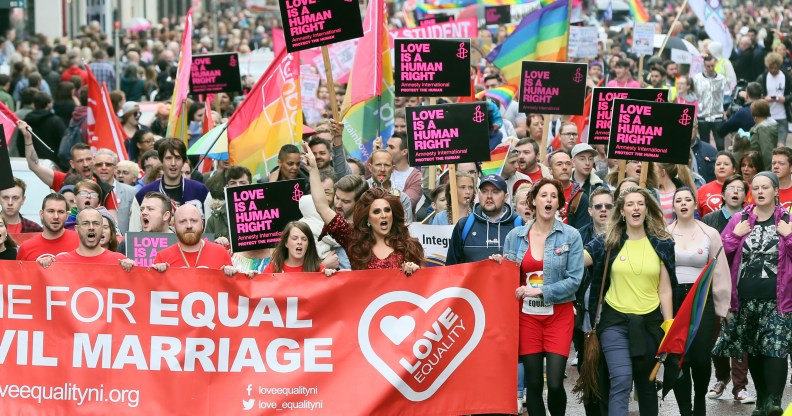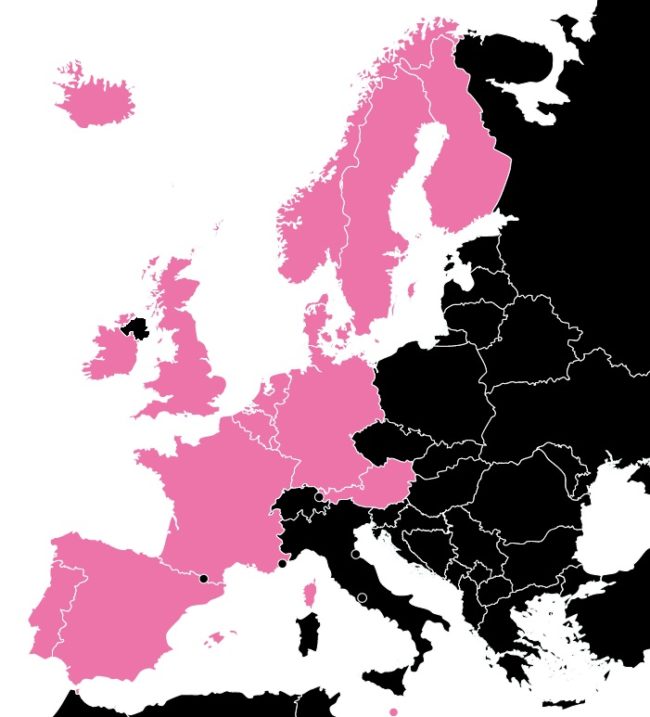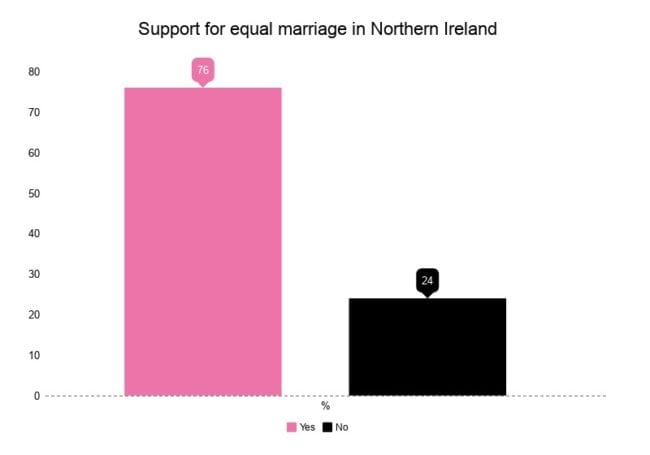Northern Ireland equal marriage measure passed by MPs in symbolic vote

Gay rights campaigners take part in a march through Belfast on July 1, 2017. (PAUL FAITH/AFP/Getty)
Gay rights campaigners take part in a march through Belfast on July 1, 2017. (PAUL FAITH/AFP/Getty)
MPs in the UK Parliament have passed a largely symbolic measure addressing the lack of equal marriage in Northern Ireland.
The backbench amendment was submitted on Wednesday (October 24) by Labour MPs Stella Creasy and Conor McGinn, who sought to address Northern Ireland’s bans on abortion and gay weddings. It passed by a vote of 207 to 117 on Wednesday evening.
The original plan published by the two MPs on Monday (October 22) would have directly repealed the measures that banned same-sex marriage and criminalised abortion in the region. However, the pair were forced to water down the plot on the day of the vote to comply with Parliamentary rules.
The revised amendment instead directs Secretary of State for Northern Ireland Karen Bradley to “issue guidance” to Northern Ireland government departments specifying “how to exercise their functions in relation to the incompatibility of the human rights of the people of Northern Ireland with [the region’s laws on marriage and abortion].”

Northern Ireland is increasingly isolated in Western Europe on equal marriage
The amendment was tacked onto a key government bill heading through Parliament intended to extend powers to civil servants in the region in the absence of the devolved power-sharing government.
The government allowed a free vote for Tory MPs on the de-fanged measure, while Labour leader Jeremy Corbyn and Lib Dem leader Vince Cable gave their backing.
The vote has been welcomed by LGBT+ campaigners in the region.
Patrick Corrigan, Amnesty International’s Northern Ireland Programme Director, said in a statement to PinkNews: “Parliament has spoken this evening and the government must listen.
“The government should now provide proper legislative time to the Private Members’ Bills sponsored by Diana Johnson and Conor McGinn which are currently working their way through Parliament. Without that support, people in Northern Ireland will continue to live as second-class citizens within the UK.
“We want to pay tribute to all the MPs from a range of parties across Westminster who backed this move and to Stella Creasy and Conor McGinn for their leadership in the Commons.”
Grainne Teggart, Amnesty’s Northern Ireland Campaign Manager, added: “People in Northern Ireland are being denied rights enjoyed by those in other parts of the UK on issues such as marriage equality and access to abortion.
“This Commons vote is a significant step toward ensuring that people in Northern Ireland can access those rights as equal citizens. It is clear there is a strong cross party constituency of support at Westminster for change.
“Women in Northern Ireland are suffering under the current legislative regime. That suffering must be brought to an end and it is within the power of the government to do so. It is time for Government to end the inequity citizens here face. Our work will continue until that happens.”
John O’Doherty from the Love Equality campaign said: “Tonight’s vote proves what we have continually argued; a substantial majority of MPs, along with a majority of MLAs and the majority of people in Northern Ireland, support the introduction of same-sex marriage in Northern Ireland.
“We would like to thank all those MPs who supported this amendment and pay special tribute to Stella Creasy and Conor McGinn for their leadership.
“The government must now show leadership and ensure that the rights of UK citizens are not defined by postcodes.
“They must listen to Parliament, to the people of Northern Ireland, and schedule parliamentary time for the Private Members’ Bills sponsored by Diana Johnston and Conor McGinn,” he added.
There was significant dissent within Parliament on the issue, however.
Tory MP Fiona Bruce, a long-time opponent of equal marriage, claimed the law “clearly has the potential to undermine devolution”, while DUP MP Jeffrey Donaldson was cautioned by the chair after shouting at Labour MPs for “telling the people of Northern Ireland what to do.”
Bradley claimed the amendment would put civil servants in Northern Ireland in an “impossible position.”
She said: “I meet campaigners on behalf of LGBT rights and all sorts of others, and well understand the desire to get on and take action in this place.
“What I have to gently say, is there is no direct rule lite, intervene a little bit here and there. All of that is direct rule, and I do not want to be in direct rule because it is wrong for the people of Northern Ireland.”
She added: “The amendment is flawed because this bill does not allow the law to be changed. We do not want to be in a position where civil servants are changing the law.”
Putting forward the amendment, Creasy said: “We love who we love, we all want control over our bodies.”
Northern Ireland has not had a functioning devolved administration since January 2017, when relations between the Democratic Unionist Party and Sinn Féin broke down.
A Sky Data poll earlier this year showed that 76 percent of people in Northern Ireland think same-sex marriage should be legal, with just 18 percent – less than one in five – opposed.

A clear majority of Northern Ireland Assembly members also support the change, but the body cannot sit without a power-sharing deal in place.
McGinn, who was named Politician of the Year at the PinkNews Awards last week, said: “I believe LGBT couples in Northern Ireland should not have to wait any longer for this injustice to end.”
He added: “The UK Government should introduce legislation to right this fundamental wrong. Sadly it has not given that commitment, and so long as it relies on the support of the DUP to remain in office, it probably won’t act of its own volition.
“It is vital the Government gets behind this change and makes sure that we get legislation to bring Northern Ireland into line with the rest of the UK and Ireland on equal marriage.”
McGinn has a backbench bill on equal marriage in Northern Ireland that is also set to come back before Parliament on October 26, though it stands little chance of passing without government support.
The comments from Love Equality were added after publication.

